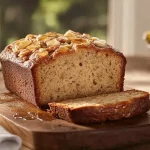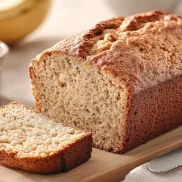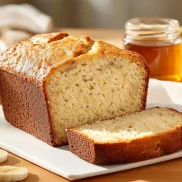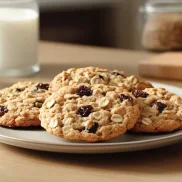What is the best oil to use when making banana bread? This question holds a special place in the hearts of bakers and snack lovers alike. But what makes a good banana bread even better? One often-overlooked answer lies in the oil you use. The oil you choose plays a vital role in determining the bread’s texture, flavor, and overall appeal. For those interested in a butter-free approach, check out this delicious banana bread recipe no butter. In this article, we’ll dive deep into the essentials, exploring how oil works its magic in banana bread and how it compares to other fats like butter and margarine. Let’s get started on this delicious journey!
Table of Contents
Understanding the Role of Oil in Banana Bread
To appreciate the importance of oil in banana bread, it’s helpful to understand what oil does during the baking process. At its core, oil acts as a fat source, a key ingredient that contributes to the bread’s structure, moisture, and mouthfeel. Unlike other fats, oil has a unique ability to coat the flour particles more effectively, preventing the formation of too much gluten. This results in a soft, tender crumb—just the way banana bread should be!
Beyond texture, oil also enhances flavor. While some oils bring a neutral profile, others, like coconut or olive oil, can add subtle hints of richness or nuttiness. The type of oil you choose can complement the banana’s natural sweetness, taking your bread to new flavor heights. It’s no wonder that oil is a favorite among bakers who want consistently moist and flavorful results. But that’s not all—let’s dig deeper into why oil is considered essential for achieving moist banana bread.
Why Oil is Essential for Moist Banana Bread
Have you ever wondered why some banana breads turn out dry and crumbly while others are irresistibly moist? The secret often lies in the type and amount of fat used. Oil, unlike butter or margarine, is 100% fat. This means it provides pure moisture without adding water content, which can evaporate during baking. This quality makes oil an ideal choice for banana bread, ensuring every bite remains luscious and satisfying.
Moreover, oil’s liquid consistency allows it to spread evenly throughout the batter, creating a consistent texture. This is particularly important in banana bread, where maintaining a uniform crumb is key to the perfect slice. When paired with ripe bananas, which are already rich in natural sugars and moisture, oil enhances the bread’s softness without overshadowing its flavor.
Another advantage of oil is its stability. While butter and margarine can create air pockets when creamed, oil’s liquid nature leads to a denser and more cohesive crumb. This characteristic is especially desirable in banana bread, where you want a moist but not overly airy texture. For bakers aiming for a foolproof recipe, oil is a reliable ally that delivers consistent results every time.
Comparing Oil with Other Fats (Butter, Margarine, etc.)
When it comes to baking banana bread, the choice between oil, butter, and margarine often sparks lively debates among bakers. Each fat has its unique characteristics, and understanding these differences can help you choose the best one for your needs.
Butter: Known for its rich, creamy flavor, butter adds a depth of taste that’s hard to beat. However, butter is only about 80% fat, with the rest being water and milk solids. While this composition contributes to a lighter crumb, it can also lead to drier banana bread if not used carefully. Butter’s solid state also requires melting before mixing, adding an extra step to your baking process.
Margarine: Margarine is a more affordable alternative to butter, with a slightly higher fat content depending on the brand. While it mimics butter’s creamy texture, margarine often contains additives and artificial flavors. Its moisture-retaining properties are better than butter but still fall short of oil’s ability to produce consistently moist banana bread.
Oil: In contrast, oil’s 100% fat content and liquid consistency make it a standout choice for banana bread. It’s easy to measure, mix, and incorporate into the batter, making the process quicker and more efficient. Additionally, oil’s neutral flavor lets the bananas and other ingredients shine, though flavored oils can be used for creative variations.
In summary, while butter and margarine have their merits, oil’s superior moisture-retention and ease of use make it the best choice for many banana bread recipes. Whether you’re aiming for a classic loaf or experimenting with unique flavors, choosing the right oil is a game-changer in the world of baking.
Types of Oils Commonly Used in Banana Bread
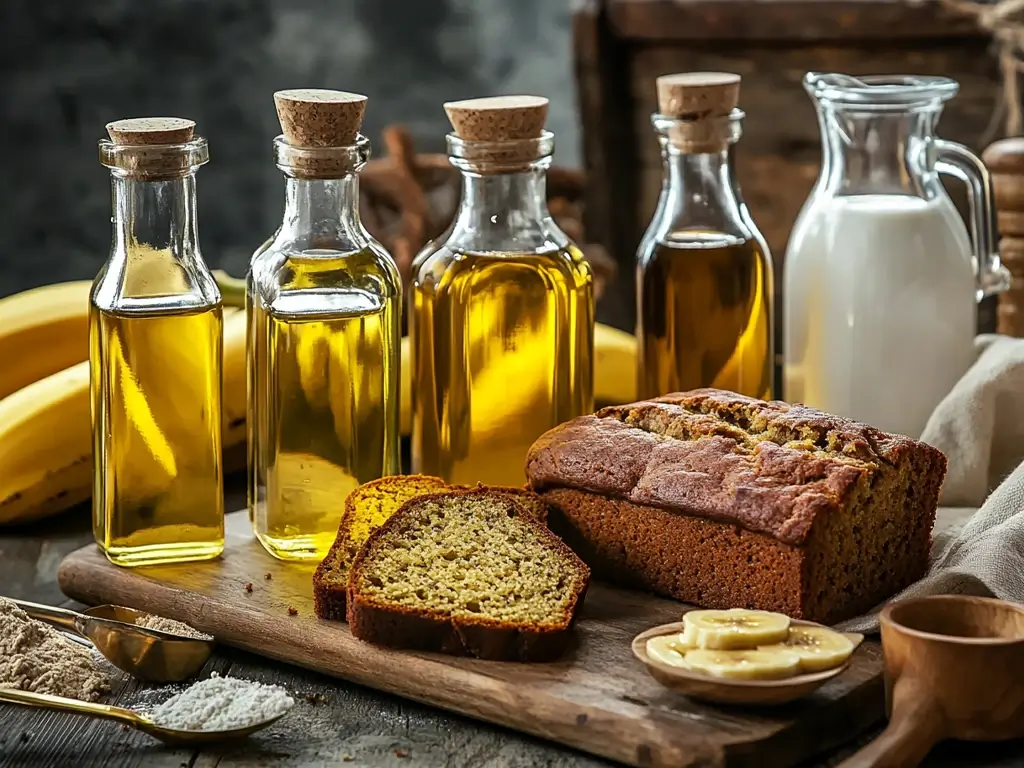
Choosing the right oil can transform your banana bread into a masterpiece. Each oil type has its unique characteristics, influencing the bread’s flavor, texture, and nutritional profile. Let’s explore some of the most popular options, from classic staples to gourmet choices.
Vegetable Oil: A Classic Choice
Vegetable oil is a go-to for many banana bread recipes, and for good reason. Its neutral flavor doesn’t compete with the natural sweetness of bananas, making it a versatile and reliable option. This oil is typically a blend of various plant oils, such as soybean, corn, or sunflower, which ensures consistency in texture and taste.
One of the biggest advantages of vegetable oil is its affordability and availability. It’s widely used because it provides a moist crumb without altering the flavor profile. If you’re making banana bread for a crowd or following a traditional recipe, vegetable oil is a safe and effective choice.
Canola Oil: The Versatile Option
Canola oil is another popular contender, prized for its light flavor and health benefits. Extracted from the seeds of the canola plant, this oil boasts a low saturated fat content and a high level of heart-healthy monounsaturated fats. It’s an excellent choice for bakers who want to create a healthier version of banana bread without compromising on texture or moisture.
Because canola oil has a neutral taste, it pairs beautifully with banana bread’s rich, sweet notes. It’s also a favorite among those looking for a budget-friendly and widely accessible oil that delivers consistent results.
Coconut Oil: A Tropical Twist
For those who enjoy experimenting with flavors, coconut oil adds a unique tropical twist to banana bread. This oil is solid at room temperature but melts quickly when warmed, making it easy to incorporate into recipes. Its subtle coconut aroma can enhance the overall flavor, especially if you’re adding ingredients like shredded coconut or macadamia nuts to your bread.
Coconut oil is also a popular choice for health-conscious bakers. It contains medium-chain triglycerides (MCTs), which are believed to provide quick energy and other health benefits. Keep in mind that using unrefined coconut oil will impart a stronger coconut flavor, while refined coconut oil offers a milder taste.
Olive Oil: An Unconventional but Healthy Option
Olive oil might not be the first choice that comes to mind for banana bread, but it’s a hidden gem for those seeking a healthier option. Rich in antioxidants and monounsaturated fats, olive oil adds a slightly fruity or peppery flavor that can elevate your banana bread’s complexity.
While extra virgin olive oil might be too robust for some palates, light olive oil provides a milder taste that complements the sweetness of bananas. Its higher price point may deter some bakers, but the nutritional benefits and unique flavor make it worth considering for special occasions.
Avocado Oil: A Gourmet Choice
Avocado oil is the ultimate choice for bakers who want to go the extra mile. Known for its buttery texture and mild flavor, avocado oil blends seamlessly into banana bread batter, enhancing its richness without overpowering the bananas. This oil is packed with healthy fats, vitamin E, and antioxidants, making it a nutrient-rich alternative to traditional oils.
One of avocado oil’s standout features is its high smoke point, which ensures stability during baking. Although it’s more expensive than other options, its luxurious texture and health benefits make it a worthwhile investment for gourmet banana bread lovers.
Each of these oils brings something special to the table. Whether you stick with a classic choice like vegetable oil or venture into the world of coconut or avocado oil, understanding the strengths of each type can help you craft the perfect banana bread every time.
What Is the Best Oil to Use When Making Banana Bread? Key Factors to Consider
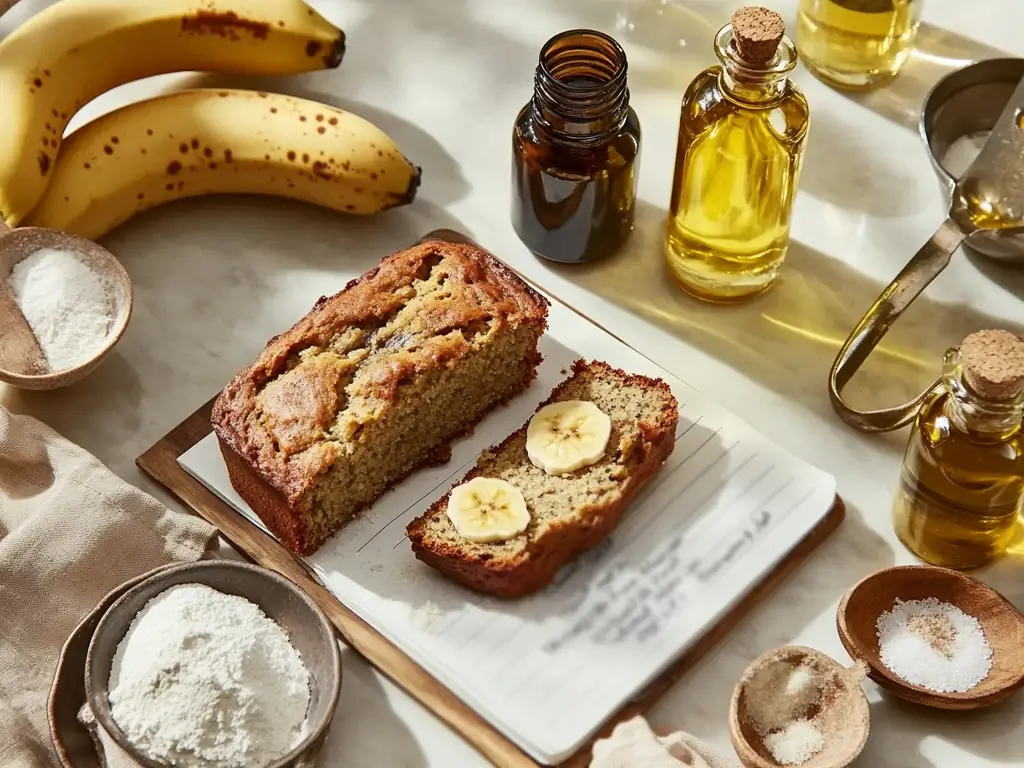
Selecting the right oil for banana bread isn’t just about grabbing what’s on hand. There are several factors to weigh, from flavor to nutritional content. Let’s delve into the key considerations that can guide you toward the perfect choice for your baking needs.
Flavor Profile and Its Impact on Banana Bread
The flavor of the oil you use can significantly influence the taste of your banana bread. Neutral oils like vegetable or canola oil are ideal if you want the natural sweetness of bananas to shine through. These options don’t add any noticeable flavor, making them perfect for classic recipes.
On the other hand, oils like coconut, olive, or avocado bring distinct flavors to the table. Coconut oil adds a mild tropical note that pairs wonderfully with bananas and other add-ins like nuts or chocolate chips. Olive oil, especially the light variety, imparts a slightly fruity or peppery taste, which can add depth to your bread’s flavor profile. Avocado oil offers a subtle, buttery richness that elevates the overall taste. Consider experimenting with flavored oils if you’re feeling adventurous, but always balance the oil’s taste with the other ingredients.
Health Benefits and Nutritional Value
If you’re health-conscious, the nutritional profile of the oil is an essential factor. Oils like canola and avocado are rich in heart-healthy monounsaturated fats, which can help maintain good cholesterol levels. Coconut oil, while higher in saturated fat, contains medium-chain triglycerides (MCTs), which are thought to provide quick energy.
Olive oil stands out for its antioxidants and anti-inflammatory properties, making it a healthy alternative for those aiming to incorporate more nutrients into their baked goods. While vegetable oil may not offer as many health benefits, it’s still a reliable choice for moist and delicious banana bread. Checking the oil’s label for added preservatives or processing methods can also ensure you’re making a health-forward choice.
Smoke Point and Baking Temperature Compatibility
The smoke point of an oil—the temperature at which it begins to burn—is another critical factor. Most banana bread recipes call for baking at around 350°F, so using an oil with a smoke point above this temperature is essential to avoid unwanted flavors or changes in texture.
Vegetable and canola oils, with smoke points ranging from 400°F to 450°F, are well-suited for baking. Coconut oil’s smoke point varies depending on whether it’s refined (about 450°F) or unrefined (350°F). Olive oil and avocado oil also have high smoke points, making them stable choices for baking. Knowing the smoke point ensures your oil won’t break down, preserving the integrity of your banana bread.
Budget and Availability
Budget and accessibility often play a role in choosing an oil. Vegetable and canola oils are typically the most affordable and widely available, making them practical for regular baking. Coconut oil and olive oil, while slightly pricier, offer unique flavors and health benefits that justify their cost for special occasions.
Avocado oil tends to be the most expensive option, often seen as a luxury choice. However, its health benefits and rich texture can make it worth the splurge for gourmet bakers. Keep in mind that some specialty oils may not be readily available at all grocery stores, so planning ahead can save time and ensure you have the perfect oil on hand.
In summary, selecting the best oil for banana bread involves balancing flavor, health, practicality, and budget. Whether you prioritize a neutral taste or want to experiment with bold flavors, considering these factors will help you create a banana bread that’s perfectly tailored to your preferences.
Healthier Alternatives to Traditional Oils
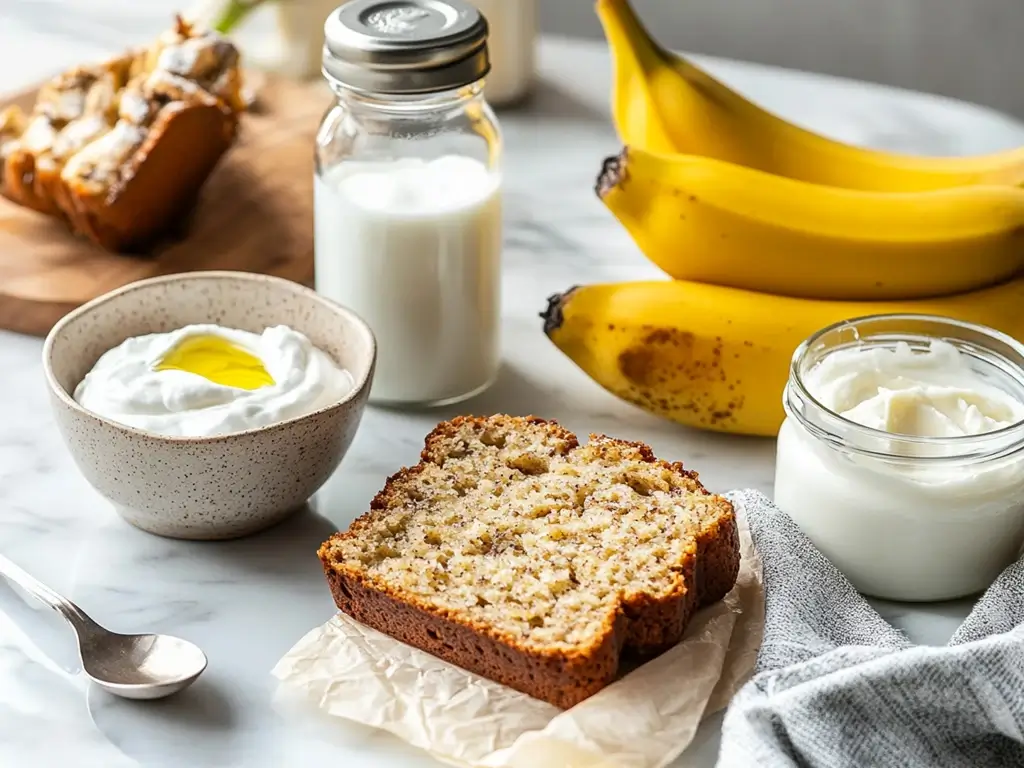
For bakers aiming to create a more health-conscious version of banana bread, exploring alternatives to traditional oils can open up a world of possibilities. Whether you’re looking to reduce calories, increase nutritional value, or incorporate organic options, these alternatives can help you achieve your goals without compromising on flavor or texture.
Low-Fat and Low-Calorie Oil Options
Reducing fat and calories in banana bread doesn’t mean sacrificing its signature moistness. One popular substitution is unsweetened applesauce, which mimics the moisture-providing properties of oil while significantly cutting down on fat content. Applesauce adds a subtle sweetness that pairs beautifully with bananas, making it a seamless swap.
Another option is Greek yogurt, which contributes creaminess and protein to the batter. Choose plain, non-fat, or low-fat varieties to keep calorie counts in check. Mashed avocado is another innovative alternative, providing healthy fats while lending a rich, buttery texture to your bread. For a more neutral flavor, consider using pureed pumpkin or mashed sweet potatoes, both of which add moisture and nutrients without overpowering the banana’s natural taste.
For those who prefer sticking with oil but want a healthier option, light versions of oils like canola or sunflower can reduce calorie content slightly. Always measure substitutions carefully to maintain the right consistency in your batter.
Organic and Cold-Pressed Oils: Are They Worth It?
Organic and cold-pressed oils are increasingly popular among health-conscious bakers, but are they truly worth the investment? These oils are often minimally processed, retaining more of their natural nutrients and flavors compared to their conventional counterparts.
Organic oils, whether coconut, olive, or avocado, are free from synthetic pesticides and fertilizers. This can be particularly appealing for those aiming to create a cleaner, more sustainable banana bread. Cold-pressed oils, extracted without heat or chemicals, maintain their integrity and often have richer flavors and higher levels of antioxidants.
Coconut oil, for example, is available in organic and cold-pressed varieties, offering the benefits of medium-chain triglycerides (MCTs) with a more natural processing method. Similarly, cold-pressed avocado oil delivers heart-healthy fats and a subtle, buttery flavor that can elevate your banana bread’s profile.
While these oils can be pricier than conventional options, many bakers find their enhanced flavor and health benefits worth the extra cost. They’re particularly well-suited for special occasions or when you want to make a statement with your ingredients.
Incorporating these healthier alternatives can help you tailor your banana bread to specific dietary needs or preferences. Whether you’re swapping oil for applesauce or upgrading to organic, cold-pressed options, these choices allow you to create a loaf that’s both delicious and nourishing.
Frequently Asked Questions
Can banana replace butter?
Yes, bananas can replace butter in banana bread recipes. Ripe, mashed bananas provide moisture and a creamy texture, making them an excellent substitute for butter. Use an equal amount of mashed banana as a replacement, but keep in mind that the flavor may be slightly altered. This substitution works best for those who enjoy a fruitier taste in their banana bread. Learn more
What is a substitute for vegetable oil in banana bread?
There are several substitutes for vegetable oil in banana bread, including unsweetened applesauce, Greek yogurt, coconut oil, and olive oil. Each option offers unique benefits. For instance, applesauce reduces fat content, while coconut oil adds a tropical flavor. Be sure to adjust quantities and baking times as needed to maintain the desired consistency. Learn more
Is olive oil good for banana bread?
Yes, olive oil is a great choice for banana bread, especially if you’re looking for a healthier alternative. Light olive oil has a mild flavor that complements the sweetness of bananas, while extra virgin olive oil adds a subtle fruity or peppery note. It’s also rich in antioxidants and heart-healthy fats.
Can I use coconut oil in banana bread?
Absolutely! Coconut oil is an excellent option for banana bread. It adds a delicate coconut flavor and is packed with medium-chain triglycerides (MCTs), which are known for providing quick energy. Refined coconut oil offers a milder taste, while unrefined coconut oil has a stronger coconut aroma.
What oil makes the moistest banana bread?
Oils with a high fat content, like vegetable oil or canola oil, are often the best choices for making moist banana bread. Their neutral flavors ensure the bread’s sweetness remains prominent while delivering a tender, moist crumb. Coconut and avocado oils also contribute to moisture with added nutritional benefits.
Is it better to use butter or oil in banana bread?
Both butter and oil have their advantages. Butter adds a rich, creamy flavor, while oil’s liquid consistency ensures a moist texture. If you’re prioritizing moisture and ease of mixing, oil is the better choice. For a more decadent taste, butter might be preferable.
Conclusion
Choosing the right oil is a crucial step in perfecting your banana bread recipe. From classic options like vegetable oil to unique choices like avocado and coconut oil, each type brings its own set of benefits and flavors to the table. By understanding the role of oil in banana bread, exploring healthier alternatives, and tailoring your choice to your personal preferences, you can craft a loaf that’s truly your own.
Whether you’re aiming for a traditional, moist banana bread or experimenting with bold flavors and health-conscious swaps, the possibilities are endless. Don’t be afraid to get creative and try new combinations to discover what works best for you. With the right oil and a dash of enthusiasm, your banana bread can go from good to unforgettable.

